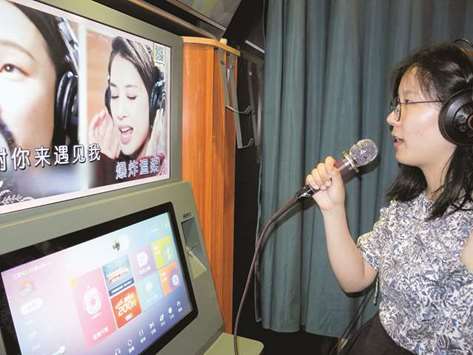It looks like a sci-fi telephone booth. But instead of talking on a phone, the person inside it is supposed to sing - alone or with a partner. This is a Chinese karaoke booth, an example of a booming trend in the country’s shopping centres and gaming halls.
A black lacquered steel frame holds the glass walls together and a curtain shields the visitor off from the outside world. Entering the small room, one finds two monitors, two microphones and two barstools. In other words, no room for a crowd.
Students Li Jingya and Duan Huimin are sitting in one booth, headphones on, crooning Chinese pop songs. The two young ladies are able to choose from Japanese, Korean and English texts, including international hits like Adele’s Someone Like You and Celine Dion’s My Heart Will Go On.
The two friends say the karaoke booth principle is both practical and entertaining. “When you are out shopping and things start to get boring, you can simply go into the booth and sing something,” 22-year-old Duan says.
An Internet connection makes the karaoke booth experience even more special. Smartphone users who install the Chinese app WeChat can use their phones to select the songs and record their performances. They can then share their recordings with friends via social media - or even through a live transmission.
But it’s not only about songs. People also use the booths to recite Chinese poems, including the patriotic Snow by Chinese communist revolutionary Mao Zedong.
In it, the former chairman of the Communist Party of China evokes the country’s beautiful landscape, its heroes and of the inadequacies of emperors past. For truly great men/Look to this age alone, he concludes.
Air conditioning and dimmable overhead lighting help the singers feel as cozy as possible. There is, of course, a charging point for phones. But even with these added comforts, will the booths ever replace the conventional karaoke?
“I still prefer the open areas,” Li says. “Inside here it feels a bit cramped.”
But not everyone feels that way. Particularly for introverted music lovers, the booths are perfect. There’s Wei Shuhang, 24, for example.
“In the booth I simply feel safer and enjoy singing by myself,” she says. She prefers the atmosphere of the booth, because she finds Chinese karaoke open places to be chaotic.
Whereas in western restuarants karaoke is often sung in front of a large audience, Chinese inns usually employ many separate rooms. That means you never know who is celebrating in the room next door and who might be able to hear your croonings.
Wei says: “I simply like the surroundings of the booth better. I don’t have to worry about my safety. But it is a bit expensive.” Half an hour in a booth costs 57 yuan (about 8.75 dollars).
First introduced in 2013, the karaoke booths are booming. By 2016, around 20,000 had been installed throughout China, and the figure is now estimated at over 30,000.
Market analysts foresee the numbers rising further and one day reaching 200,000. A booth costs between 20,000 and 30,000 yuan (3,080-4,615 dollars). The investment can be recouped in about half a year, the analysts say. – DPA

SINGER: A woman sings in a karaoke booth in Beijing.
